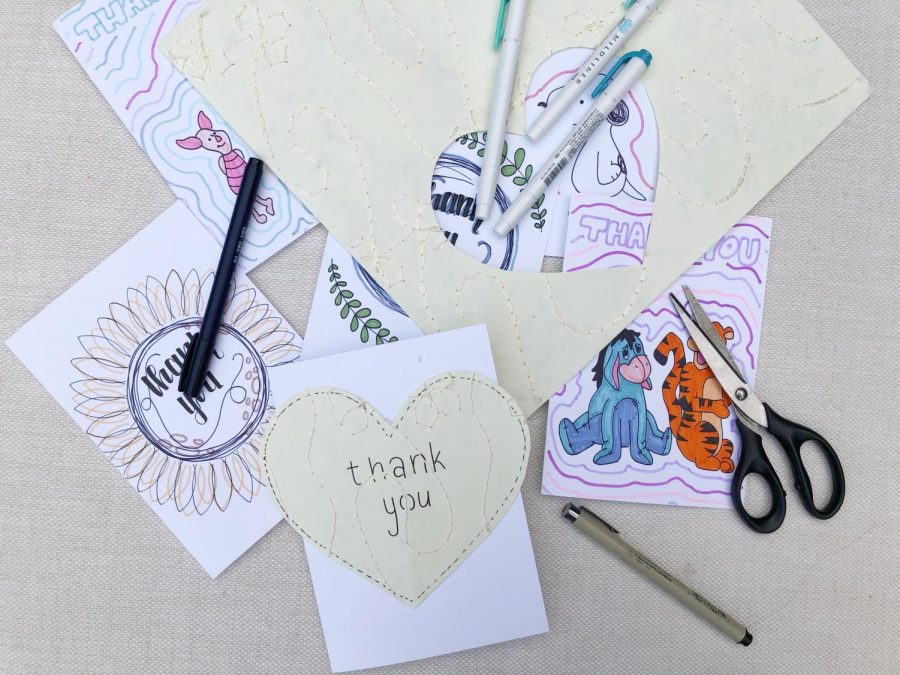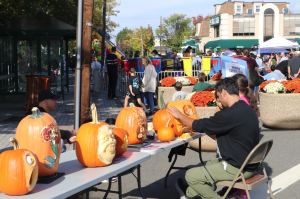The Harsh Realities of Working Front Line
May 8, 2020
THS freshman Anjali Jathavedam is raising awareness of the realities of the long hours and tough responsibilities of our frontline workers.
Through a Facebook post, where she encourages students to partake in a project that would do just that, she writes, “Hey everyone! As we all know, there has been an influx of coronavirus patients throughout the hospitals of Bergen County. It has greatly affected hundreds of families, including many in Tenafly. My dad works in Englewood Hospital and the workers there are enduring difficult times. He was wondering if you could write letters to all the staff, nurses, and doctors that are treating patients. These frontline workers are working very long hours and risking their health and their family’s health to treat patients. Writing a letter would mean a lot. Please consider this. There is a box outside my house (I will message you the address if you choose to participate) where you can drop the letters. My dad will bring them to the hospital. Thank you so much!”
As we ourselves work to “combat” our own boredom and the limitations of social distancing, we soon lose touch with the seriousness and corporealities of our situation. Many worldwide and even within our own towns have already suffered the losses and impacts of this pandemic. Doctors and nurses continually return to their workplaces, endangering their own health and well-being in order to treat ill patients. As we indulge in our luxuries of comfort and security, we forget the true costs of our complacency and what this virus involves beyond online schooling and canceled plans. Jathavedam’s project returns us to confront the gravity of our circumstances as well as reflect upon the services and sacrifices of those working in the hospitals.
Our frontline health workers have become our ultimate servicemen and the firm backbones of our society amidst the chaos of this entire pandemic. They’ve tied countless families to health care systems, aiding those in need and saving thousands of lives, both globally and locally.
Frontline healthcare workers deal with the responsibilities of confronting this largely unknown virus and properly tending to the overwhelming mass of those infected. Workers are forced to work longer hours and face unfamiliar procedures in response to this outbreak, leaving them worn out, and in many cases, physically burnt out. The large factors of risk and a general deficit of provisionary supplies already place these healthcare workers at a significant disadvantage, beyond just the great ambiguity of the virus itself. Our healthcare workers have had to make countless sacrifices of their own in exchange for the well-being of their patients, even if it is at the final cost of their own.
Nurse Sehan, a dialysis nurse working at the Saint Joseph Regional Medical Center in Paterson, reports on his own experience: “When the COVID-19 positive patients were starting to arrive in the hospital, all the staff were worried about the uncertainties. Soon, intubated patients were filling ICU and then the whole hospital was filled with COVID-19 patients. The most difficult part that we had to endure was the lack of personal protective equipment (PPE). There was an instance where I had to use one N95 mask for a week and use a face shield made at home.
“There was an instance when my friend who was worried about me asked me to quit my job for now and return. ‘I can’t abandon my patients and coworkers. If we all quit, who is going to take care of the sick patients? I have to remain strong, so that my co-workers can also remain strong,’” he replied.
Beyond just a demanding physical threat and burden, the outbreak of the virus has also proven to come with a challenge of mentality, as Nurse Sehan insinuates. Faced with wave after wave of incoming patients, frantic family and the knowledge of the risk to come, the situation may soon appear to become hopeless. Supplying a regular reserve of motivation and morale throughout this time has become increasingly challenging, and even mentally exhausting.
On Sunday, April 26th, a top E.R. doctor in Manhattan passed away by suicide. Accounts detail that Dr. Lorna Breen, Medical Director of the New York-Presbyterian Allen Hospital, had treated many coronavirus patients before contracting the virus herself. She had returned to her family in Charlottesville, Virgina, where she passed. According to statements made by her father, Dr. Philip Breen, Dr. Lorna Breen had appeared “detached” and distressed, having described to her father of her experience of the thousands of patients she had had to watch die before even being taken out of the ambulances, as her area had been hit especially hard by the virus. “She tried to do her job, and it killed her.” We must remain aware and sympathetic of the physical and mental strain this virus has put on our doctors and nurses. We often live with a mentality that overlooks these details and the overt fact that these people are humans too.
Within these challenging times, our front line healthcare workers are met with this difficulty that’s worked within manipulations of physical, mental, and emotional distress. Perhaps even you yourself have been forced within that demanding position by this virus, in whatever way that may be. However, most are yet unaware of these ordeals and tests of endurance.
Oftentimes, overwhelmed by our own circumstances, we may become ignorant to those of others. Of course, we could never truly empathize with those with experiences such as Dr. Lorna Breen’s or even fully understand the entailing commitments and responsibilities of these jobs. However, we must remain as aware and compassionate towards these situations as possible, and this includes offering our utmost support. Jathavedam’s project offers a platform that presents an opportunity to do just that.
Dr. Jathavedam (Anjali’s father), an infectious disease specialist at the Englewood Hospital shares his own perspective of the situation, especially in regards to the card project:
“The hospital has been different since the pandemic started. The office is different in that a lot of work is done by telemedicine which is new for most doctors and patients. The frontline workers are very cognizant of the risks of getting ill themselves but obviously take all precautions. There is a general fatigue that sets in after seeing wave after wave of sick patients. The community has been supportive—donating meals, masks, etc. The cards that people sent remind the frontline staff of the deep impact our work can have on the community and humanizes the experience.
“Right now it’s very stressful for everyone working at the hospital. Receiving cards, meals, etc. from the community helps to lift spirits as well as brighten one’s day a little, especially when dealing with such ill patients. I think everyone that has received a card has been very appreciative.”
Offering our encouragement as a backing support reminds our frontline workers of the significance of their sacrifice, as well as the reapings of their effort. Much of their day-to-day lives have come to revolve around the hospital and serving patients. Even outside of their workplace, doctors and nurses are forced to meet new agendas and timetables to meet the needs of their patients, both in hospitals and in their homes. While Dr. Jathavedam comments on a considerate surge in phone calls throughout the night, Nurse Sehan reports of a complete change within his family and household dynamic, in order to take precautionary measures in response to his new situation at work.
Of course, our health care workers understand the risks of contracting the virus themselves, better than even we ourselves. While returning to their workplace, continually exposing themselves to the virus day by day, doctors and nurses are forced to meet new modifications to accommodate their circumstances.
Rachael Kim, daughter of Nurse Sehan, accounts of her own experience of the pandemic: “When COVID-19 first reached New Jersey, I was scared. I knew this virus would eventually reach the hospital my father works at. In fact, it was one of the first hospitals to have COVID-19 positive patients. Reading articles with the name of my dad’s hospital broke me knowing that one by one, the virus is spreading, putting more risk on my father’s health. To keep my family safe, my father isolated himself from the rest of my family so that we can be safe. He was isolated with plastic to prevent the virus from spreading in case he was infected. It’s been almost two months since I was able to give him a hug and the best thing I was able to do was send love and lots of prayers. In the end, I know he makes these sacrifices for the better of the world.”
Tenafly High School student, Rowan Copes, a participant of Jathavedam’s project, encourages others to partake in the small gesture. “I think it’s very important that we do all that we can to help those on the front line. These people are putting others before themselves, and are saving lives; the least we can do as a community is brighten their days and thank them for all they are doing.”
Although we are not able to do much, offering supportive cards may go a long way. In these times of heightened fears and anxieties, it is crucial that we as a community are able to step up to whatever means of support or service we are able to offer, even if the only aid we are able to offer is received in the form of a (seemingly) insignificant card. However, we are not limited to just Jathavedam’s project. If anything, beyond just homemade cards, her project offers the encouragement to act. So, how are you going to respond?


















































































































































